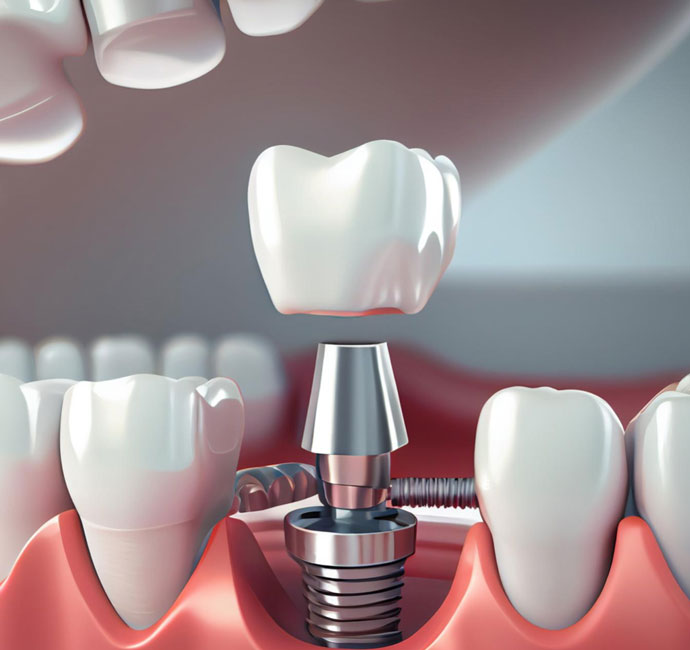Implant Treatment
A dental implant provides a strong foundation for fixed and permanent or removable dentures made to match your natural teeth. In other words, a dental implant is an artificial tooth root that is artificially placed in your mouth to support a dental prosthesis, such as dentures or bridges. They are screws made of tissue-friendly titanium that are inserted into the jaw and act like the roots of the missing tooth.

Is Implant Treatment Suitable for Everyone?
Anyone who is healthy enough for routine tooth extraction or oral surgery can usually be considered a candidate for dental implants. It is important that you have smooth bones and healthy gums. Patients should commit to good oral hygiene after the implant and visit the dentist regularly. Heavy smoking, diabetes or heart disease, radiation therapy to the head/neck area, implant placement should be considered individually.
What is the Success Rate of Implant Treatment?
Although the success rate of dental implant results varies depending on where they are placed in the jaw, it is known that this treatment is one of the most successful treatments. With proper care, it is possible to use implants for a lifetime.
Benefits of a Dental Implant
Dental implants look like your own teeth and give you the feeling of natural teeth. They are also permanent because they are designed to fuse with the bone. In fact, the only difference between dental implants and real teeth in terms of appearance and feel is that they are not real teeth. This treatment, which is performed using various techniques and has many advantages, can be given as an answer to the question, “What are dental implants?”
- In addition, dental implants prevent you from experiencing any difficulties while speaking. With ill-fitting dentures, teeth can shift in the mouth and cause mispronunciation. Dental implants allow you to speak without worrying about your teeth shifting.
- Your teeth’s roots are attached to your jaw like tree roots. When a tooth is lost, a root socket remains, and these roots are restored with implants.
- Traditional dentures often shift, making it difficult to enjoy the taste of food. Dental implants function just like your natural teeth, allowing you to enjoy your favorite foods without extra effort or discomfort. They provide better biting force than traditional dentures.
- Dental implants completely eliminate any confidence issues you may have had with your smile and make you feel much better about yourself.
- With dental implant treatment, there is no need to reduce or alter the shape of adjacent teeth, as is necessary with bridges. Since the adjacent teeth are not altered to support the implant, your own teeth remain healthy in your mouth for a long time. With implants, new teeth can be obtained without damaging adjacent teeth, and a support/frame that serves as a natural framework for the tooth is placed on top. Implants also improve oral hygiene and provide easy access between teeth.
- If oral hygiene rules are followed, implants can be used for a long time, even for a lifetime.
Frequently Asked Questions
- Protection of the neighboring teeth next to the tooth cavities without cutting
- Prevention of melting of the jawbone in the tooth cavity
- Easier oral hygiene applications
- The teeth can be done one by one as in the natural sequence and thus hygiene is increased
- Better chewing
- Eating whatever you want
- A more aesthetic appearance
- A happier social life
- Healthier nutrition due to being able to eat everything has advantages such as.
Implant screws have a certain thickness and width. For this reason, the jawbone of the area where the implant should be placed must be of sufficient height, width and quality to accept the screw. The gums must also be healthy before the implant treatment and during the implant's stay in the mouth. If the patient's general health condition is good before the implant and there is no condition that will prevent the application, implant treatment can be successfully applied.
When the appropriate anesthesia method is applied during implant treatment, you will not feel any pain or ache. At the time of the procedure, general or local anesthesia is used according to the patient's preference. The pain that may be felt in the evening after the implant is placed can be prevented with simple painkillers. After the treatment is completed, you will not even feel the presence of the implants and you will not understand any difference from your existing teeth.
Long-term pain after implant treatment is a rare but common occurrence. After a successful implant treatment in a suitable environment, there is no long-term pain. It is normal to experience mild pain.
+90 530 033 00 44

 EN
EN

